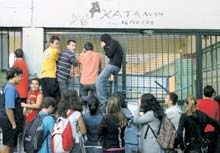Increased Tensions at Greek Universities
 From Libcom:
From Libcom:
More than 300 secondary and high schools (that is 1/6 of the national total) around Greece are currently occupied by their pupils who are demanding the reversal of several articles of the conservative educational reform that caused widespead revolt by students and university staff during the academic years of 2005-2006-2007. The renewed resistance to the law which has been rejected by the entire school and academic community and is considered to be the first step towards the abolition of student-pupil participation in management, is being faced with unprecedented measures of repression. There have been consistent efforts by the government and the local authorities to criminalise the school squats, whereas neonazi attacks against squatted schools in Athens have been reported.
Most recently, on the 17th of October, the president of the pupil's council and one more pupil of the 4th high-school of the city of Karditsa were arrested on charges of obstructing the function of a public service, after the pupils of the squatted school staged a demo against the installation of an iron fence around the premises, with the central slogan being "School is not a Prison". After the reaction of the Teacher's Union (OLME) the pupils were released.
While the repression escalates, several schools in Athens and Thessaloniki have opposed the annual election of representatives, opting for direct-democratic procedures without the realm of state-recognised legality. In the city of Peiraeus, on the 17th of October the Autonomous Coordination Squat Committee, held a protest march for "Liberatory free and public education".
Unsurprisingly, the right-wing Greek news media are pooh-poohing the protests as little more than privileged kids whining about not enough choices in the cafeteria. Kathimerini:
The lockouts at schools have become something like the first rain in the autumn or the traditional annual strike by the General Confederation of Greek Labor (GSEE) union.
Every fall, small groups of pupils take over entire school complexes with various demands that vary from the perfectly logical to the downright absurd. There is, for example, currently a lockout at a school in Athens because children are demanding “more products in the school canteen.”
It’s a fact that many schools have problems with their buildings and equipment. But lockouts do not solve these problems. In many cases, they actually make things worse, as people from outside the schools go on the rampage and cause damage that the taxpayer ends up paying for.
The Greek education system is not experiencing its brightest period at the moment. Many people over a number of years are responsible for this but the responsibility of parents is even greater. They have to explain to their children that lockouts make the problem worse and that shortages are not solved by missing classes.
As we've reported on many times in the past, Greek students are fighting to preserve what little of their educational system remains outside the neoliberal ideal of privatized, commodified, top-down and undemocratic institutions. It's a trend that is happening across the globe, but few are resisting it as tenaciously as Greek youth. Part of that likely comes from Greece's uniquely heroic history of youth fighting against injustice (check out the Wikipedia page of the famed Athens Polytechnic Uprising).
The latest from Greece is hard to come by in English, and most of what I can find is just a few paragraphs with no new information.